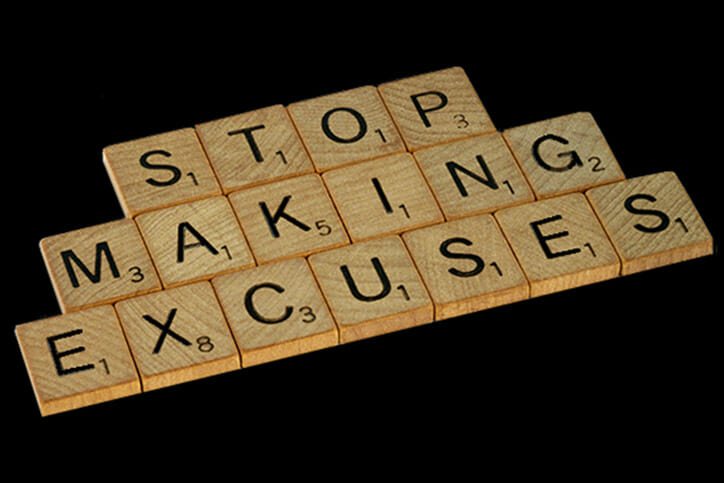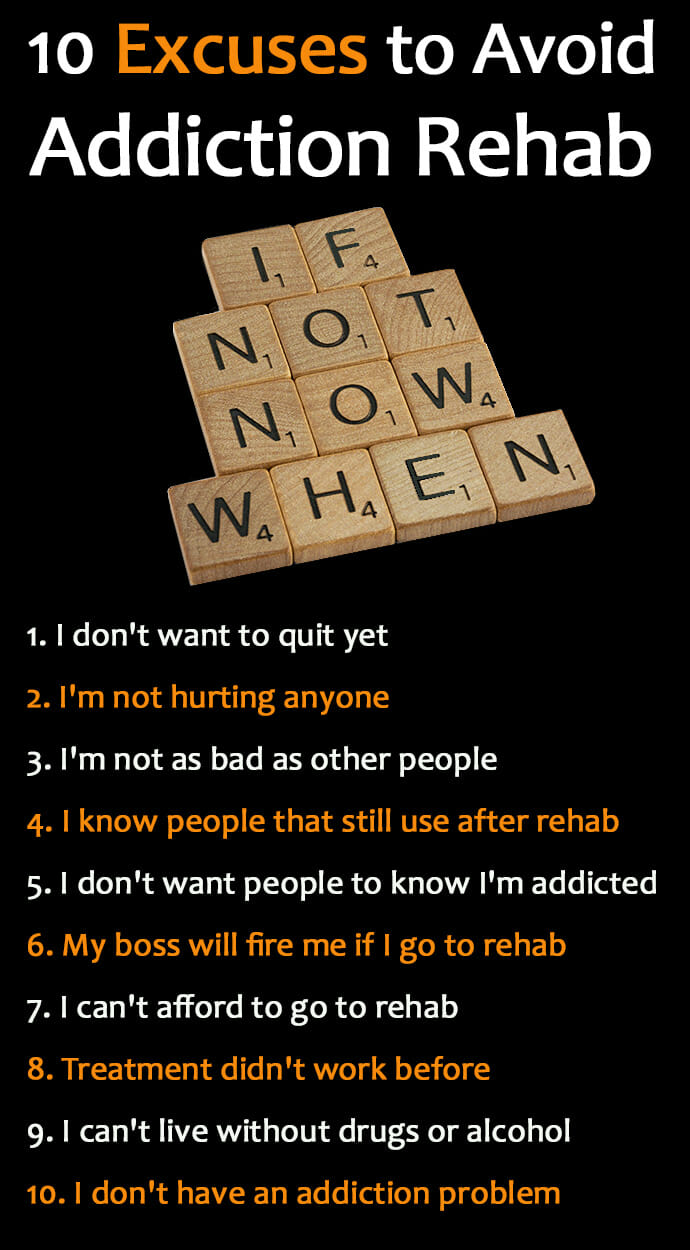Table of Contents
Addiction is an equal opportunity disease. It can affect anyone regardless of age, race, ethnicity, or socio-economic level. While the reasons a person might struggle with a substance use disorder are unique to them, most people battling issues with drugs and alcohol tend to have similar excuses for not going to addiction treatment.
Public awareness surrounding the disease of addiction is higher than ever before, although there is still often a stigma associated with the disorder. This can make it difficult for people who need and want help to come forward.
Society’s perception of a person suffering from drug or alcohol abuse is often someone who has lost their job, home, family and friends, and has ended up in jail or court ordered treatment.
Though this might be true in some cases, the vast majority of people living with a substance use disorder have not lost these things or been in trouble with the law.
He or she may recognize, however, that their life is more chaotic and problematic as a result of their behaviors and yet they continue their self-destructive path.
More than 40 million Americans lived with a substance use disorder in 2020, according to the National Survey On Drug Use and Health.
Unfortunately, the survey data showed less than 6 percent of those who needed it ever received any treatment.
Excuses People Use to Avoid Going to Addiction Treatment
There are many valid reasons why people don’t get proper drug or alcohol addiction treatment.
Some truly don’t know they have an actual problem. Others live far from treatment facilities or ever receive medical attention that might steer them into treatment.
At the same time, there are plenty of others who realize they need help, but find ways to avoid going to rehab by making excuses for not going to addiction treatment.
Here are 10 Excuses for Not Going to Addiction Treatment
1. Quitting is no big deal, I just don’t want to yet
In some cases, people with a substance use disorder really believe that they can quit drinking or doing drugs whenever they want. They may not truly recognize their problem, or may blame others for any trouble it has caused.
Maybe they’ve been able to stay sober for periods of time, but always find themselves going back to drugs and alcohol, despite the problems it creates. The physical and mental symptoms of addiction will only get worse without treatment.
2. I’m not hurting anyone, so leave me alone
This is a typical excuse, even for those people who are aware they have serious issues and need drug or alcohol treatment. The problem is, addiction often drives risky behaviors that are a danger to society-at-large.
These can be issues like driving under the influence, domestic violence, or even overdosing in a public setting.
Beyond the broader societal impact, addiction is known to tear families apart. It can be devastating for a child to watch a parent, or a loved one see their partner succumb to substance abuse, and it often leaves them with a lifetime of trauma.
3. I’m not nearly as bad off as some people I know
Comparing ourselves to others, though not necessarily healthy, is something most people do. For people battling drug or alcohol addiction, it’s easy to look at someone whose disease is more progressed and say, “See, I’m doing better than them. That’s the kind of person that needs help, not me.”
In truth, a person’s life does not need to be completely devastated by drugs and alcohol before they get treatment. Pointing at others that are worse off is simply a convenient way to deny one’s own problems.
For anyone that continues using drugs or alcohol without addressing the problem, someday they may end up just like the person they used as an example of someone that needs help.
4. I know a person that went to treatment and they’re using drugs and alcohol again
This is just another type of comparison excuse that doesn’t hold up in the end. Relapse is a part of the process for many types of diseases, and relapse rates for addiction are similar to relapse rates of other chronic disorders, like diabetes, asthma, and some cancers.
Additionally, relapse does not mean that treatment did not work for that person. In fact, treatment for addiction can actually decrease the amount of time a person spends in relapse before they once again resume their recovery.
Addiction treatment helps people improve the quality of their life, even if they relapse. And good treatment programs teach people how to get back on track if they slip.
5. I don’t want people to know I have a problem
This can be a valid and very scary concern for people. But in reality, it’s quite common that family and friends are already aware there is some sort of problem.
They might not have all the details, but perhaps they noticed a change in behavior, mood swings, or a shift in friends and activities. If you know, they probably do too.
Completely concealing addiction is often very difficult, even if a person thinks no one can tell.
The thing to focus on is that friends, family, and other loved ones are likely to be supportive of a person they care about getting the help they need. They may even admire the courage it takes to admit a problem and seek the necessary help.
6. My boss will fire me if I go to rehab
This is also a valid concern for some people, though there might be more protection from this than they realize.
The Family Medical Leave Act (FMLA) allows for up to 12 weeks of uncompensated time off for medical care, including treatment for addiction. The law applies to any business with 50 or more employees, as well as all public agencies.
Looking at it another way, most people are better off getting help and recovering, than having their boss find out they have a problem with drugs or alcohol and didn’t address it.
All it takes is one accident at work while drunk or stoned to end your job or career. Then your boss really will fire you.
7. I can’t afford to go to rehab
The cost of any form of medical care can seem high for most of us. While some addiction rehab centers are more expensive than others, there are often affordable options.
Most treatment centers work with a range of insurance companies, and many offer payment plans, scholarships., or even help finding loans and other payment options. It’s worth it to contact them to see how everything works before giving up because of the cost perception.
One thing to consider too is the physical, mental, and financial cost of avoiding treatment. In the long-term, getting treatment for addiction can be a wise financial move when considering the rest of your life.
8. Treatment didn’t work the first time, why would I do it again?
As stated earlier, relapse is a common part of addiction and recovery. It’s not uncommon for people to undergo several rounds of treatment over a period of years before they achieve a steady path of recovery.
People come to treatment at all levels. For instance, a person might not be as personally open to recovery in their first round of treatment as they are in their second for any number of reasons.
Most treatment centers provide relapse prevention therapy. Many can help a person transition into sober living, aftercare programs, and support groups to maintain a sense of well-being while working on the next phase of recovery.
There are also different types of treatment approaches, like outpatient, 12 step programs, or non 12 step rehab treatment.
9. I can’t see myself living a life without drugs or alcohol
One of the problems with addiction is that it becomes so engrained in a person’s behavior that they start to believe its part of their personality.
In truth, alcohol and drug abuse is often a way to self-medicate underlying issues of trauma, depression, anxiety, symptoms of post-traumatic stress disorder or other issues.
These are the very underlying drivers of addiction that are addressed, especially in dual diagnosis treatment for addiction.
Treatment approaches like cognitive behavioral treatment (CBT), one-on-one counseling, group therapy or family counseling, if appropriate, give people tools to manage these issues without drugs and alcohol.
10. I don’t have an addiction problem
Denial is a “go-to” excuse for many people dealing with substance abuse and addiction. They might even believe it, despite the nagging truth right in front of their eyes.
If a person continues to drink alcohol or do drugs despite negative consequences that continue to escalate, it is clear that they have a problem.
He or she may have tried to stop using or “scale back” many times before and failed. Their social media may look like they’re always in a bar or at a party.
Eventually, denial catches up to people and the symptoms of addiction will worsen to the point that they cannot be ignored without severe repercussions.
More Excuses for Not Going to Addiction Treatment
The 10 excuses for not going to addiction treatment above are pretty common and most people will stick to one, while others may use several of them at a time.
But those aren’t the only excuses people use.
Here is a quick list of other excuses that may sound familiar
- I’ll go after summer vacation or when the holidays are over
- People in treatment will judge me
- I’m afraid of drug and alcohol detox
- I don’t feel comfortable opening up about my problems
- I need drugs or alcohol to cope with my pain
- My family won’t survive if I leave home for treatment
- I don’t have any way to get to treatment
- I’ll fail out of school if I take time off
- I’ll lose my apartment if I’m away for too long
Fear is one of the biggest reasons why people don’t seek help for addiction, and they need these excuses to avoid facing their fear.
Denial also ruins deep with people who are addicted to drugs and alcohol and some simply like the feeling of getting high.
At some point, many diehards will mature out of it and get tired of living like they have for so long and decide to get clean.
Unfortunately for others, they hit rock bottom and addiction treatment is the only way of staying alive or out of jail.
For anyone who might think they have a problem but are afraid they won’t be able to get sober, talk to those who made it through treatment and are successful in recovery. Many of them love to help others get through it.





